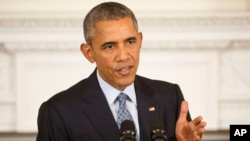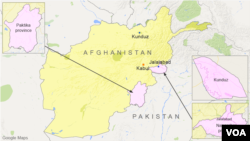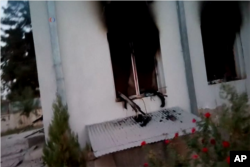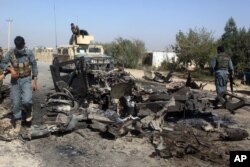President Barack Obama has apologized to Doctors Without Borders for the U.S. bombing of the international medical charity's hospital that killed 22 people last weekend in Kunduz, Afghanistan.
White House spokesman Josh Earnest said Obama called the medical group's president, Dr. Joanne Liu, to "apologize and express condolences."
"In this case, there was a mistake and it's one that the U.S. owns up to," Earnest said. He said Obama "is very eager to get to the bottom of what exactly occurred."
In a statement issued Wednesday afternoon, Liu acknowledged receiving Obama's call, but repeated her earlier demand for an independent panel to conduct an investigation under the Geneva Conventions, "to establish what happened in Kunduz, how it happened and why it happened."
The Geneva Conventions are a set of international treaties and protocols regulating the conduct of armed conflict and aim to protect people not taking part in hostilities and those who are no longer doing so.
Hours before her conversation with President Obama, Liu said the organization, known by its French acronym MSF, cannot rely on the internal probes being conducted by the U.S., Afghanistan and NATO.
MSF has suggested that the bombing could be considered a war crime, but White House spokesman Earnest said "no one has offered any evidence that it's anything but a terrible, tragic mistake."
Obama also called Afghan President Ashraf Ghani to voice his condolences for the innocent loss of lives in the aerial bombardment Saturday, the spokesman said, and to commend Afghan forces for their bravery in the fight to control the northern Afghan city in clashes with Taliban insurgents.
Meanwhile, U.S. officials are probing whether the military exceeded its authority for use of force in Afghanistan in launching the airstrike.
The top U.S. commander in Afghanistan, Army General John Campbell, says the United States is taking the blame for carrying out Saturday's raid after Afghan forces requested it to attack Taliban insurgents it believed were firing from inside the medical facility. But the question remains whether the U.S. should have agreed to the attack.
When Obama ended American ground combat operations in Afghanistan last year, he said that the residual force of 9,800 U.S. troops remaining there should focus on training and advising Afghan troops. He limited the use of force to three circumstances: the defense of U.S. and allied troops, support for missions targeting remnants of al-Qaida insurgents in Afghanistan, and assisting Afghan troops facing mass casualties in extreme situations.
It is not clear whether the U.S. bombing of the hospital met any of those criteria.
Campbell told a congressional committee Tuesday the hospital was "mistakenly struck" and the United States "would never intentionally target a protected medical facility."
He said he has ordered American forces in Afghanistan to be retrained on their use of force.









